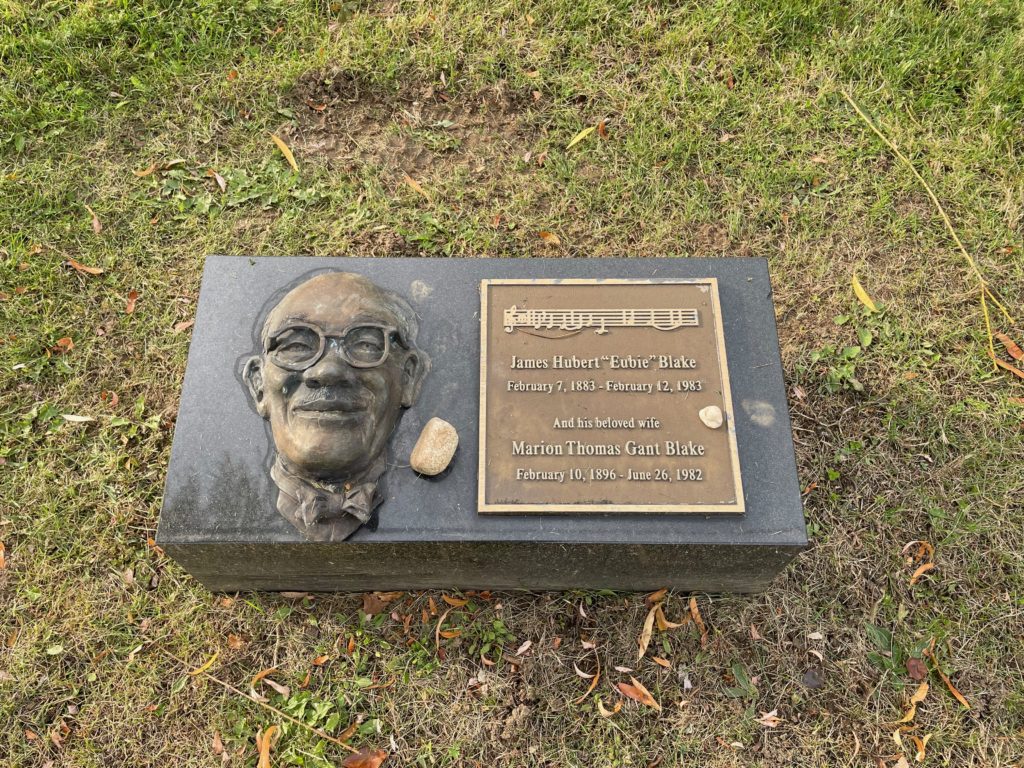Erik Visits an American Grave, Part 1,007
This is the grave of Eubie Blake.

Born in 1887 in Baltimore, Blake grew up poor. I know that his gravestone says 1883 and in fact Blake had long claimed this, but the record shows it as 1887. His parents had been slaves. His father was now a stevedore, which was a common job for Black men in ports. It also was hard and didn’t pay well. Eubie was the only child to survive to adulthood. From the first time Blake sat down at a piano (at least according to legend) he was very good at it. In any case, his parents did invest their meager resources in their boy, buying him a pump organ on an installment plan. He took to it right away and started writing his own music, or at least remembering it since he didn’t learn how write in musical notation until he was an adult.
By the time he was 15, Blake was playing piano in a Baltimore brothel. In 1907, the boxer Joe Gans, one of the early legendary lighweights, hired Blake to play in his mixed race hotel and music club. He did this for years during the winter while summering in Atlantic City clubs. He was a good entertainer and people liked his playing a lot. Not surprisingly, this led to vaudeville acts based around ragtime. Working with Noble Sissle, Blake started writing musicals. That first led to Shuffle Along, the 1921 play that was the first Broadway musical by, for, and about Black Americans. It included songs that would become all-time standards, such as “I’m So Wild about Harry.” Now, did this play build on blackface humor and stereotypes? Yes, it did. This was the reality of the time. Being on Broadway meant appealing to different audiences and everyone knew this humor. I have little doubt Black customers read it very differently than the white ones, but it did reinforce stereotypes.
Blake started recording songs in 1917 and did so consistently through the 1920s, making him one of the most popular singers of that period. He also appeared in a bunch of early movies, including early sound experimentation. After all, if you were going to try and make a sound film, why not do it with the day’s most popular musicians? He also provided the music for the 1932 Bojangles Bill Robinson film Harlem is Heaven.
By the 1940s, Blake’s style was old-fashioned, but he still had an audience. He directed a band for the USO in World War II. After the war, he retired from performing and enrolled in NYU to get himself the proper musical education he always wanted for himself. This helped him write down all the songs he knew over the years that he did not know how to write down, which was a tremendous number of songs given his long career. He probably wrote or co-wrote about 350 songs, but knew many thousands more from being on the road and entertaining constantly over the decades.
While Blake mostly disappeared from the spotlight in the 50s and 60s, there was something of a revival for him in the 1970s. He became a favorite on a lot of late night and variety TV shows, including The Tonight Show and Merv Griffin. Leonard Bernstein and Arthur Fiedler played a big role in reviving his music, as they were huge fans and often played his work with their orchestras. Late in life, he got a bunch of honorary degrees and then the Presidential Medal of Freedom in 1981, from Reagan. Trying to imagine a modern Republican giving such an award to someone like Blake, as opposed to, you know, Rush Limbaugh. Anyway, there were late-life revues of his work and he got a role acting in the Scott Joplin biopic starring Billy Dee Williams in 1979.
Still playing up how old he claimed to be, Blake was pretty pumped to have a 100th birthday party. It was in fact his 96th birthday, but in any case, he had a grand ol’time. He then died five days later.
Eubie Blake is buried in Cypress Hills Cemetery, Brooklyn, New York.
There is today a Eubie Blake Cultural Center.
If you would like this series to visit other pioneers of early twentieth-century Black music, you can donate to cover the required expenses here. Scott Joplin is in Queens and W.C. Handy is in The Bronx. Previous posts in this series are archived here.


